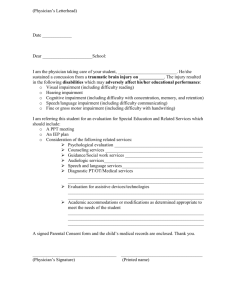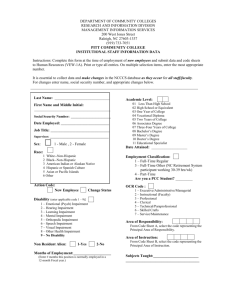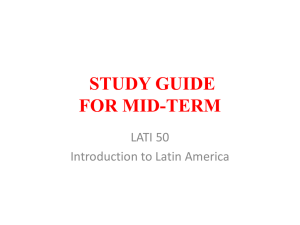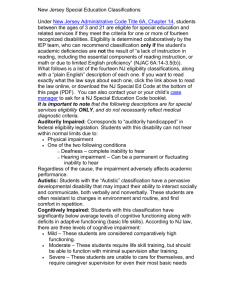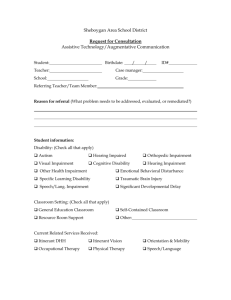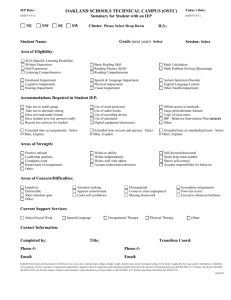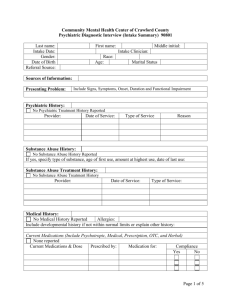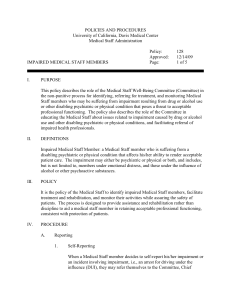MISSISSIPPI HOSPITAL ASSOCIATION LEADERSHIP
advertisement
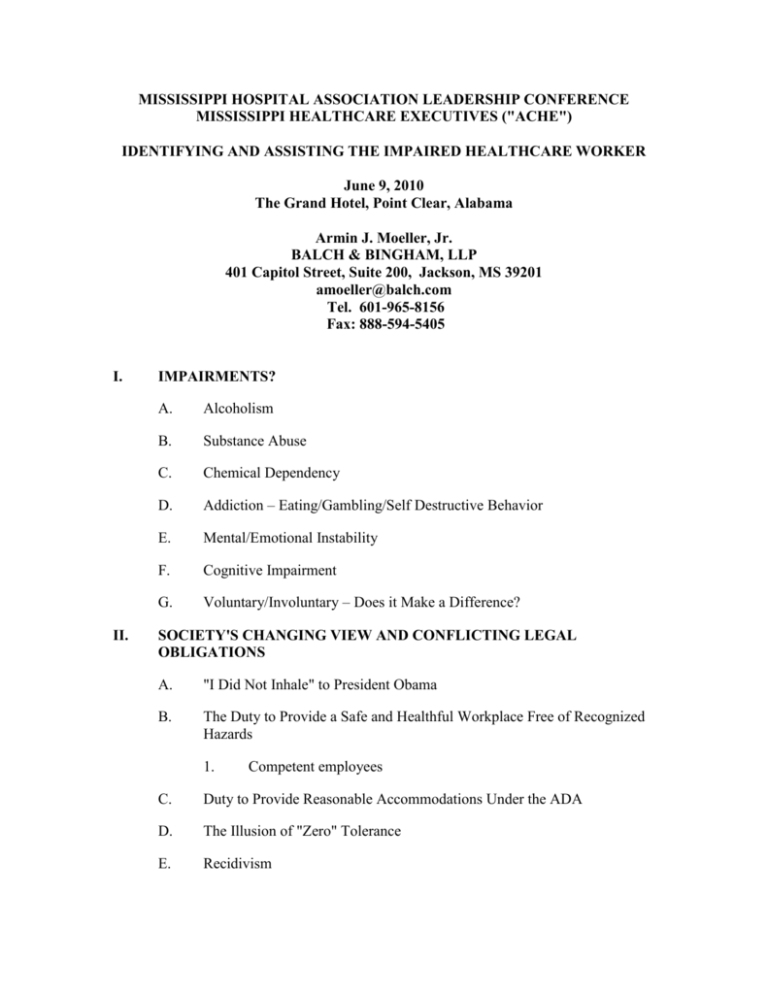
MISSISSIPPI HOSPITAL ASSOCIATION LEADERSHIP CONFERENCE MISSISSIPPI HEALTHCARE EXECUTIVES ("ACHE") IDENTIFYING AND ASSISTING THE IMPAIRED HEALTHCARE WORKER June 9, 2010 The Grand Hotel, Point Clear, Alabama Armin J. Moeller, Jr. BALCH & BINGHAM, LLP 401 Capitol Street, Suite 200, Jackson, MS 39201 amoeller@balch.com Tel. 601-965-8156 Fax: 888-594-5405 I. II. IMPAIRMENTS? A. Alcoholism B. Substance Abuse C. Chemical Dependency D. Addiction – Eating/Gambling/Self Destructive Behavior E. Mental/Emotional Instability F. Cognitive Impairment G. Voluntary/Involuntary – Does it Make a Difference? SOCIETY'S CHANGING VIEW AND CONFLICTING LEGAL OBLIGATIONS A. "I Did Not Inhale" to President Obama B. The Duty to Provide a Safe and Healthful Workplace Free of Recognized Hazards 1. Competent employees C. Duty to Provide Reasonable Accommodations Under the ADA D. The Illusion of "Zero" Tolerance E. Recidivism III. FROM SUSPICION TO ACTION A. Looking for Symptoms – Does a Problem Exist? 1. Absenteeism a. b. c. d. e. f. g. h. i. 2. On-The-Job-Absenteeism a. b. c. d. 3. difficulty in recalling instructions, details increasing difficulty in handling complex assignments difficulty recalling own mistakes Spasmodic Work Patters a. 7. work requires greater effort job takes more time Confusion a. b. c. 6. accidents on the job accidents off the job that affect job performance Difficulty Concentrating a. b. 5. continued and prolonged absences from the work area frequent trips to the water fountain or restroom long coffee breaks physical illness on the job High Accident Rate (and consequently, more accident claims) a. b. 4. multiple instances of unauthorized leave excessive sick leave frequent Monday and/or Friday absences repeated absences, particularly if they follow a pattern excessive tardiness, especially on Monday morning or after lunch leaving work early peculiar and increasingly improbable excuses for absences higher absenteeism rate than other employees for colds, flu frequent unscheduled short-term absences, with or without medical explanation alternate periods of high and low productivity Report to Work a. 8. Generally Lowered Job Efficiency a. b. c. d. e. f. 9. coming or returning to work in an obviously abnormal/impaired condition missed deadlines mistakes due to inattention or poor judgment wasting more material making bad decisions complaints from user of product improbable excuses for poor job performance Poor On-the-Job Employee Relationships a. b. c. d. e. overreaction to real or imagined criticism wide swings in morale complaints from co-workers unreasonable resentments avoidance of associates Source: Chris Drake, Account Manager, Metropolitan Family Services, Employee Assistance Network, Chicago B. Suspected Impairment – Observation Checklist OBSERVATION CHECKLIST Employee Name ______________________________ 1. WALKING _____Stumbling _____Staggering _____Falling _____Unable to Walk _____Swaying _____Unsteady _____Holding On 2. STANDING _____Swaying _____Rigid _____Unable to Stand _____Feet Wide Apart _____Staggering _____Sagging at Knees 3. SPEECH _____Shouting _____Silent _____Whispering _____Slow _____Rambling _____Mute _____Slurred _____Slobbering _____Incoherent _____Confused 4. DEMEANOR _____ Cooperative _____Polite _____Calm _____Sleepy _____Crying _____Silent_____ Talkative _____Excited _____Sarcastic _____Fighting 5. ACTIONS _____Resisting Communications _____Fighting ____Threatening _____Calm _____Drowsy _____Profanity _____Hyperactive _____Hostile _____Erratic 6. EYES _____Bloodshot _____Watery _____Dilated _____Glossy _____Droopy _____Closed _____ Normal 7. FACE _____Flushed _____ Pale _____Sweaty 8. APPEARANCE/CLOTHING _____Unruly _____Messy _____Dirty _____Partially Dressed _____Body Excrement _____Stains _____Neat _____Having Odor 9. BREATH _____Alcoholic Odor _____Faint Alcohol Odor _____No Alcoholic Odor 10. MOVEMENT _____ Fumbling _____Jerky _____Slow _____Normal _____Nervous _____Hyperactive 11. EATING/CHEWING _____Gum _____Candy _____Mints _____Other (identify if possible):___________ 12. Other observations: (visible drug use, possession, sale, etc.; attendance; poor work performance or accident; tampering with drug test; credible reports, etc.) Observed by: Observed by: Date: Time: Location: C. Missing Equipment/Theft/Drug Shortages D. What Can I Do? E. 1. Employee or non-employee? 2. Non-employee a. physician b. employee of contractor/vendor i. effective employee? ii. right to require? iii. impairment program iv. right to order removal? Can I Confront? – What Do Your Policies Say? 1. Investigations policy 2. 3. Cooperation policy a. full cooperation – answer all questions truthfully b. provide specimens upon request Drug testing/alcohol testing policy – Mississippi Law a. 4. The prescription medications problem a. F. G. IV. V. public hospital – safety sensitive positions HIPAA complainant release medical/drug prescription records Investigations – Who Can Assist? 1. Audit/Ethics/Security department representatives 2. HR professionals/department managers 3. Private investigators/security consultants 4. In-House/Outside counsel Effective Witness Interviews 1. General/Open ended questions 2. Follow with focused questions 3. Who, what, when, where and how questions 4. Discover all details remembered 5. Solicit interviewee for other witnesses/sources of information 6. Don’t avoid the tough questions OBJECTIVE OF INVESTIGATION A. Find Facts/Conclusions – Truth B. But if Not Certain – Good Faith/Reasonable Grounds Upon Which to Act COOPERATION REVISITED A. Public Hospital Employees – Right Against Self-Incrimination? B. Right To Counsel? Representative? C. VI. YOU CAN'T FIRE ME FOR THIS! OR CAN YOU? A. B. VII. Right To Record? (Where's My Court Reporter!) Americans With Disabilities Act 1. Must accommodate physical and mental impairments 2. Alcoholism an impairment 3. Recovering substance abusers protected ADAA 1. Employer to engage in interactive process to provide reasonable accommodations to qualified individuals with disabilities 2. What did you know/when did you know it? C. Hospital Need Not Be Clairvoyant D. Misconduct Versus Reasonable Accommodation 1. Any knowledge of impairment? 2. Any request for assistance? 3. Self-identification and request for help 4. Engaged in dischargeable offense a. knowledge of impairment prior to offense? b. attempted interactive process/intervention? rejected? THE PROACTIVE HOSPITAL - LIMITING LEGAL RISKS WHILE REQUIRING PERFORMANCE A. Statement of Policy – "Consistent with Our Hospital's Values We Support/Assist Our Employees to Manage and Overcome Not Only Ordinary but Even Extraordinary Challenges to Their Well Being Including Chemical and Alcohol Dependency …." B. Policies! 1. Cooperation 2. Investigations 3. HIPAA compliant releases 4. Duty to report prescription medications and receive approval C. EAP D. Insurance Coverage for Treatment with Our Approval E. No Return Without Completion of Treatment/Release Satisfactory to Us 1. The recidivism problem F. Last Chance Agreement G. Referral to Specialists – Hospital Contribution for Payment H. Impaired Physician Program I. Impaired Nurse Program J. Is It Fair? Strict Compliance, and Hope, and Never Giving Up?


